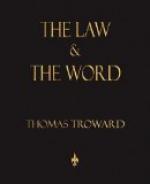in the animal world we find wonderful instances of
longevity. If an elephant be not overworked before
he is twenty, he is in full working power up to eighty,
and will then be capable of light work for another
twenty years, after which he may yet enjoy another
twenty years of quiet old age as the reward of his
labours, while crocodiles and tortoises have been known
to live for centuries. If then such things be
possible in the ordinary course of Nature in the animal
world, why need we doubt the specializing power of
the Word to produce far greater results in the case
of man? It is because we will not accept the
maxim, that “Principle is not limited by Precedent”
in regard to ourselves, though we see it demonstrated
by every new scientific discovery. We rely more
on the past experience of the race, than on the Creative
Power of God. We call Him Almighty, and then
say that in His Book He promises things which He is
not able to perform. But the fault is with ourselves.
We limit “the Holy ONE of Israel,” and
as a consequence get only so much as by our mental
attitude we are able to receive—again the
old maxim that “Power can only work in terms
of the instrument it works through.” I do
not say that it is at all easy for us to completely
rid ourselves of negative race-thought ingrained into
us from childhood, and subtly playing upon that generic
impersonal self in us of which I have spoken, and which
readily responds to those thought-currents to which
we are habitually attuned. It is a matter of
individual growth. But the promises themselves
contain no inherent impossibility, and are logical
deductions from the principles of the Creative Law.
If the power of the Spirit over things of the material
plane be an impossibility, then by what power did
Jesus perform his miracles? Either you must deny
his miracles, or you must admit the power of the Spirit
to work on the material plane—there is no
way out of the dilemma. Perhaps you may say:
“Oh, but He was God in person!” Well, all
the promises affirm that it is God who does these
things; so what it is possible for God to do at one
time, it is equally possible for Him to do at all
times. Or perhaps you hold other theological views,
and will say that Jesus was an exception to the rest
of the race; but, on the contrary, the whole Bible
sets Him forth as the Example—an exception
certainly to men as we now know them, but the Example
of what we all have it in us to become—otherwise
what use is He to us? But apart from all argument
on the subject we have his own words, telling us that
those who believe in Him, i.e., believe what
He said about Himself—shall be able to
do works as great as His own, and even greater (John
xiv, 12). For these reasons it appears to me
that on the authority of the Bible itself, and also
on metaphysical and scientific grounds we are justified
in taking such promises as those I have quoted in a
perfectly literal sense.
Then there are promises of the power that will attend
our utterance of the Word. “Thou shalt
also decree a thing and it shall be established unto
thee” (Job xxii, 28). “All things
are possible unto you” (Mark ix, 23). “Whosoever
... shall believe that what he sayeth cometh to pass,
he shall have whatsover he sayeth” (Mark xi,
23), and so on.




